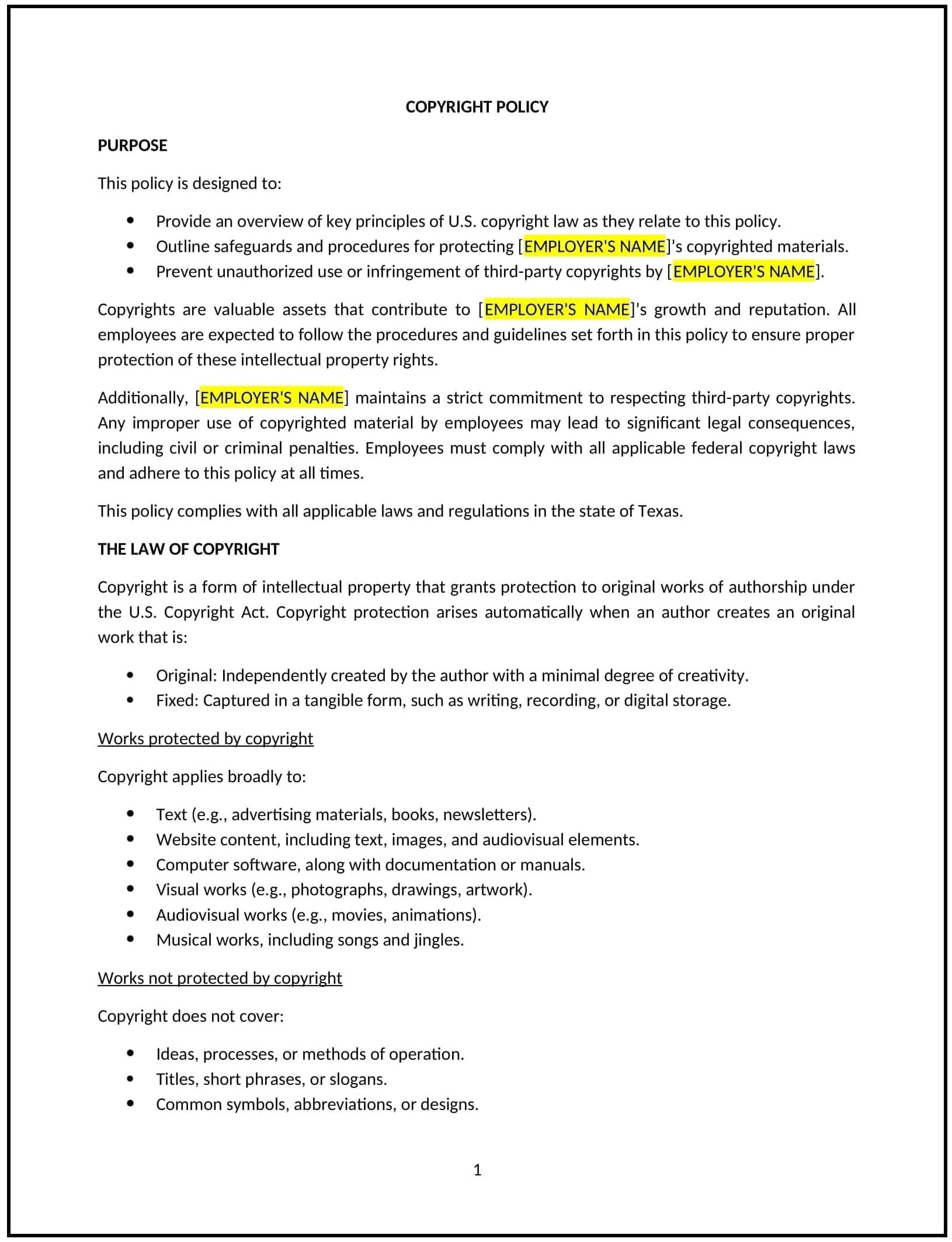Got contracts to review? While you're here for policies, let Cobrief make contract review effortless—start your free review now.

Customize this template for free
Copyright policy (Texas)
This copyright policy is designed to help Texas businesses establish clear guidelines for respecting and protecting intellectual property rights, specifically regarding copyright. Whether businesses are creating original works, using third-party content, or managing licensing agreements, this template provides a structured approach to ensuring that copyrights are respected in the workplace.
By adopting this template, businesses can minimize the risk of copyright infringement, promote proper use of creative works, and protect their own intellectual property rights.
How to use this copyright policy (Texas)
- Define copyright ownership: Clearly specify who owns the copyright for works created by employees during their employment, including company-developed software, marketing materials, written content, designs, and other intellectual property.
- Address third-party content: Outline the procedures for using third-party copyrighted materials, including obtaining proper licenses or permissions, and ensuring that the business complies with copyright laws when incorporating third-party content into its work.
- Set guidelines for creating original content: Provide guidelines for employees who create original content (e.g., written materials, artwork, software) on behalf of the company, including proper attribution and how to protect their own intellectual property rights.
- Establish procedures for handling copyright infringement claims: Define the process for addressing any copyright infringement claims, including how the business will investigate allegations, take corrective actions, and handle potential disputes.
- Specify consequences for violations: Clearly state the consequences for employees who violate the copyright policy, including disciplinary actions, potential legal repercussions, or termination, depending on the severity of the violation.
Benefits of using this copyright policy (Texas)
This policy offers several benefits for Texas businesses:
- Reduces legal risks: A clear copyright policy helps businesses minimize the risk of copyright infringement and associated legal consequences, including lawsuits, fines, and reputational damage.
- Protects intellectual property: The policy ensures that the business’s own copyrighted materials are protected from unauthorized use or reproduction, safeguarding the company’s creative work and assets.
- Promotes compliance: By outlining the necessary steps to comply with copyright laws, businesses can help ensure that employees understand their responsibilities in using both third-party and company-created content.
- Encourages proper content usage: The policy provides guidelines for using third-party materials responsibly, ensuring that the business obtains necessary licenses and permissions to avoid potential infringement.
- Builds a culture of respect for intellectual property: A formal policy reinforces the company’s commitment to intellectual property rights and encourages employees to value and respect the creative work of others.
Tips for using this copyright policy (Texas)
- Communicate clearly: Ensure all employees are aware of the copyright policy and understand the importance of respecting copyright laws when creating, using, or distributing content.
- Provide training: Offer training on copyright laws, including how to identify copyrighted material, obtain necessary permissions, and protect company-owned content.
- Implement tracking systems: Use systems to track third-party content usage and ensure proper licensing for any content incorporated into the company’s work.
- Regularly audit content: Periodically audit the business’s content library to promote compliance with copyright laws and identify any unauthorized usage or potential risks.
- Review regularly: Update the policy as necessary to reflect changes in Texas state laws, federal regulations, or business practices related to copyright management.